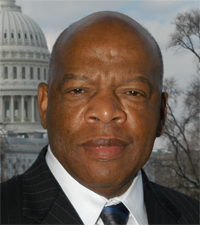John Lewis has spent all of his adult life as a champion for civil rights. Born in Troy, Alabama in 1940, he was the third son of a large family. His parents were sharecroppers. While growing up, he witnessed segregation in full tilt. He remembers times when even checking out a book from the library was reserved for white people only. After high school, Lewis attended American Baptist Theological Seminary and Fish University, both in Nashville, TN. It was here that he became a leader of the Nashville sit-ins that ultimately led to the desegregation of lunch counters. He was also arrested many times in the struggle to desegregate the whole downtown Nashville area. While a student, he was introduced to non-violent workshops, and he became a dedicated adherent to the discipline and philosophy of nonviolence, something he still practices to this day.
 Lewis became one of the youngest leaders of the tumultuous 1960’s civil rights movement. He participated in the Freedom Rides, and followed Martin Luther King and Rosa Parks on the radio. He and his family supported the Montgomery Bus Boycott. He was chairman of the Student Nonviolent Coordinating Committee (SNCC) from 1963-66, during which time they opened Freedom Schools, launched the Mississippi Freedom Summer and voter registration efforts that led to the Selma-to-Montgomery marches. He was named as one of the “Big Six” leaders (along with Whitney Young, A. Phillip Randolph, James Farmer and Roy Wilkins) to organize the 1963 March on Washington where MLK delivered his “I Have a Dream” speech. Lewis was the youngest speaker that day. In his speech, he was going to ask “Which side is the federal government on?” when looking at the passivity of the government in the face of Southern violence. Other organizers eliminated that line, not wanting to offend the Kennedy Administration, but it was a question he would not let die. His subsequent leading of the Freedom Rides, which were bombed, and where Lewis was also beaten and left unconscious on the bus station floor, showed that federal government was not yet up to the task, simply calling for a “cooling-off period” and a moratorium on Freedom Rides. Lewis was imprisoned for 45 days for his participation.
Lewis became one of the youngest leaders of the tumultuous 1960’s civil rights movement. He participated in the Freedom Rides, and followed Martin Luther King and Rosa Parks on the radio. He and his family supported the Montgomery Bus Boycott. He was chairman of the Student Nonviolent Coordinating Committee (SNCC) from 1963-66, during which time they opened Freedom Schools, launched the Mississippi Freedom Summer and voter registration efforts that led to the Selma-to-Montgomery marches. He was named as one of the “Big Six” leaders (along with Whitney Young, A. Phillip Randolph, James Farmer and Roy Wilkins) to organize the 1963 March on Washington where MLK delivered his “I Have a Dream” speech. Lewis was the youngest speaker that day. In his speech, he was going to ask “Which side is the federal government on?” when looking at the passivity of the government in the face of Southern violence. Other organizers eliminated that line, not wanting to offend the Kennedy Administration, but it was a question he would not let die. His subsequent leading of the Freedom Rides, which were bombed, and where Lewis was also beaten and left unconscious on the bus station floor, showed that federal government was not yet up to the task, simply calling for a “cooling-off period” and a moratorium on Freedom Rides. Lewis was imprisoned for 45 days for his participation.
After leaving SNCC, he spent the next decade working with community organizations and  for the National Consumer Co-op Bank in Atlanta as community affairs director. He entered into politics in 1977. After an unsuccessful bid for Congress that year, he accepted a position in the Carter administration as associate director of Action, running the VISTA program, the Retired Senior Volunteer Program and the Foster Grandparent Program. He left that after 2.5 years to run for and win a seat on the Atlanta City Council in 1981. In 1986 he was elected to the US House of Representatives, a seat he now holds. He is considered one of the most liberal members of Congress, but also can be fiercely independent and is known as the “conscience of Congress.” He opposed the Clinton adminstration on NAFTA and welfare reform, asking “Where is the sense of decency? What does is profit a great nation to conquer the world, only to lose its soul?”
for the National Consumer Co-op Bank in Atlanta as community affairs director. He entered into politics in 1977. After an unsuccessful bid for Congress that year, he accepted a position in the Carter administration as associate director of Action, running the VISTA program, the Retired Senior Volunteer Program and the Foster Grandparent Program. He left that after 2.5 years to run for and win a seat on the Atlanta City Council in 1981. In 1986 he was elected to the US House of Representatives, a seat he now holds. He is considered one of the most liberal members of Congress, but also can be fiercely independent and is known as the “conscience of Congress.” He opposed the Clinton adminstration on NAFTA and welfare reform, asking “Where is the sense of decency? What does is profit a great nation to conquer the world, only to lose its soul?”
Despite having seen some of the ugliest that humanity can dish out, Lewis is routinely upbeat and optimistic. For today, we have his words about that: “When I was a student, I studied philosophy and religion. I talked about being patient. Some people say I was too hopeful, too optimistic, but you have to be optimistic just in keeping with the philosophy of non-violence.”
